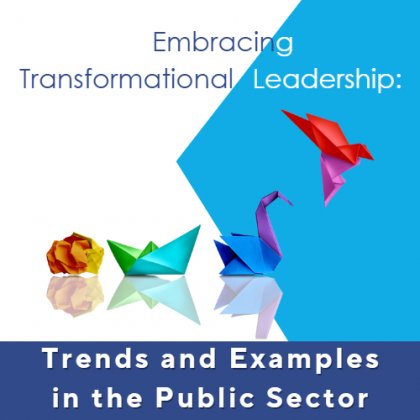By Jun Kit Man, Digital Media Manager
In an ever-changing world, effective leadership is essential for organisations to adapt and thrive, particularly within the public sector.
As civil servants face rapid technological advancements, shifting societal norms, and global challenges, transformational leadership has emerged as a pivotal leadership style to navigate these complexities. This blog post will explore the concept of transformational leadership, discuss current trends, and provide examples of its successful implementation in the public sector.
Understanding Transformational Leadership
Transformational leadership, first introduced by James V. Downton in 1973 and further developed by James MacGregor Burns in 1978, is a leadership style characterised by the ability to inspire and motivate followers to achieve more than they initially thought possible. Transformational leaders possess four key components, often referred to as the "Four I's":
Idealised Influence: They act as role models, gaining trust and respect through their actions. They display high levels of integrity, ethical behaviour, and consistency in their decision-making, demonstrating the values they expect from their followers.
Inspirational Motivation: They articulate a clear, compelling vision and inspire others to work towards it. They set high expectations and communicate their confidence in their followers' abilities to achieve the set goals. This approach fosters a sense of purpose, enthusiasm, and optimism among the team.
Intellectual Stimulation: They encourage creativity, innovation, and critical thinking among their followers. They challenge the status quo, promote open dialogue, and value diverse perspectives. They create a learning environment where followers feel comfortable taking risks and exploring new ideas.
Individualised Consideration: They demonstrate genuine care and concern for their followers' needs and personal growth. They invest in their followers' development, provide mentorship, and create opportunities for growth. They recognise and celebrate individual achievements, fostering a sense of belonging and value.
The Relevance of Transformational Leadership in the Public Sector
In the public sector, transformational leadership is particularly relevant due to its potential to drive positive change, enhance organisational performance, and improve employee satisfaction. This leadership style is essential for civil servants as they navigate complex challenges, such as:
Adapting to Rapid Technological Change: Transformational leaders encourage innovation and embrace new technologies, helping their organisations stay ahead in a rapidly changing world. They foster a culture of continuous learning and development, enabling employees to acquire the necessary skills to adapt to evolving technological demands.
Responding to Shifting Societal Norms: Transformational leaders are attuned to societal changes and strive to create inclusive, diverse, and equitable environments. They promote social responsibility and ethical decision-making, ensuring that their organisations contribute positively to the broader community.
Addressing Global Challenges: As civil servants increasingly face complex, cross-border issues, such as climate change, migration, and public health crises, transformational leaders are well-equipped to navigate these challenges. They inspire collaboration, creativity, and resilience, empowering their teams to develop innovative solutions to pressing global problems.
Developing Transformational Leadership Skills
For civil servants looking to develop transformational leadership skills, the following strategies can be useful:
Self-Reflection: Engage in regular self-reflection to assess your leadership style, strengths, and areas for improvement. Seek feedback from your team and peers, and consider working with a mentor or coach to guide your growth.
Emotional Intelligence: Develop your emotional intelligence by cultivating self-awareness, empathy, and effective communication skills. Engage in active listening, demonstrate compassion, and strive to understand the emotions and perspectives of your team.
Continuous Learning: Invest in Continuous Learning: Invest in your professional development by participating in training programs, workshops, and seminars focused on leadership and management skills. Stay informed about industry trends, best practices, and emerging technologies, and encourage your team to do the same.
Encourage Innovation: Foster a culture of innovation by creating a safe environment where team members can share their ideas, take risks, and learn from failures. Encourage open dialogue, invite diverse perspectives, and provide resources and support for creative problem-solving.
Tailor Your Approach: Recognise that each team member is unique and may require different approaches to motivation and development. Adapt your leadership style to meet the individual needs of your followers, providing personalised support and guidance.
Examples of Transformational Leadership in the Public Sector
Jacinda Ardern Former New Zealand Prime Minister
Ardern's empathetic and compassionate leadership style has garnered global attention. She has been praised for her swift and effective response to crises, such as the Christchurch mosque shootings in 2019 and the COVID-19 pandemic. By prioritising the well-being of her citizens and demonstrating genuine care, she has inspired unity and resilience within her country.
Sir Michael Barber, Former Head of the UK Prime Minister's Delivery Unit
Barber played a crucial role in driving public sector reform under Prime Minister Tony Blair. He implemented the "deliverology" approach, focusing on setting clear targets, monitoring progress, and ensuring accountability. His leadership led to significant improvements in public services, such as healthcare and education.
Barack Obama, Former President of the United States:
Barack Obama is considered a transformational leader due to his historic election as the first African American President, charismatic communication, vision for change, significant policy initiatives like the Affordable Care Act and Paris Agreement, emphasis on inclusivity and diversity, and focus on diplomacy and global cooperation. These qualities and achievements inspired and motivated people in the United States and around the world.
Conclusion
Transformational leadership is a powerful approach for civil servants and public sector organisations looking to navigate the challenges of the modern world. By developing the skills associated with the "Four I's" and embracing a growth mindset, civil servants can become effective transformational leaders who inspire positive change, drive innovation, and foster resilience within their teams and organisations. By learning from the examples of successful transformational leaders, public sector professionals can enhance their leadership skills and better serve their communities.

